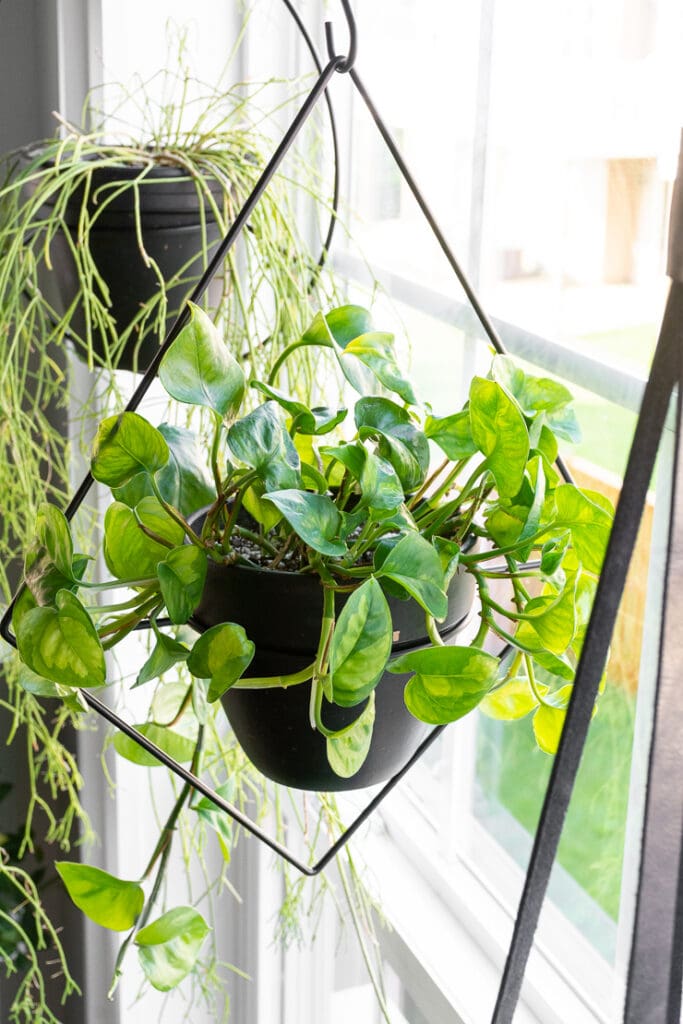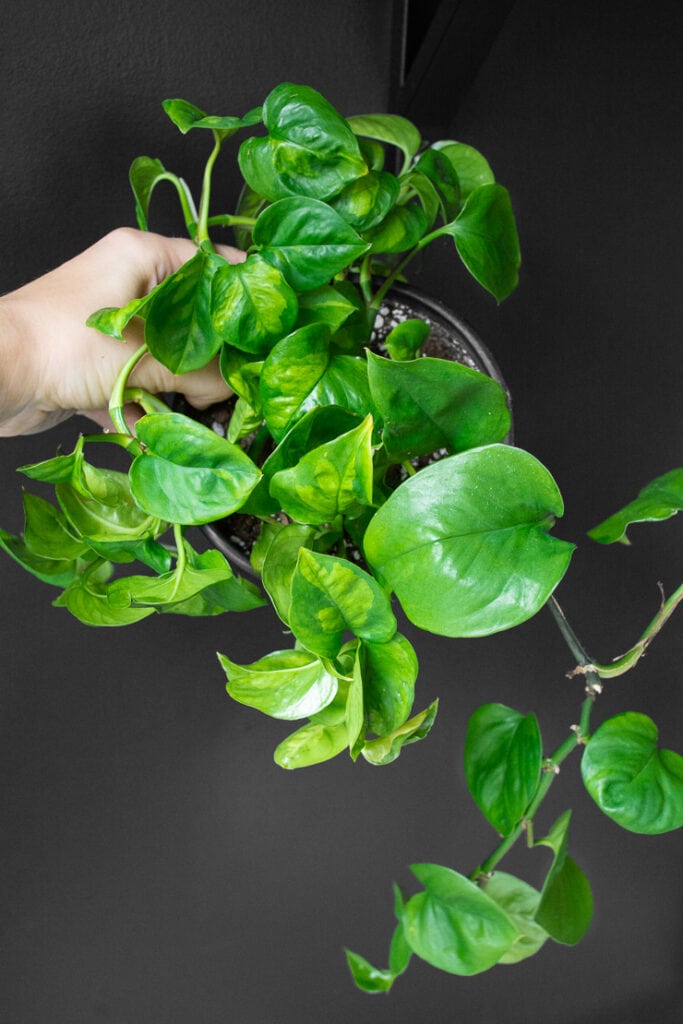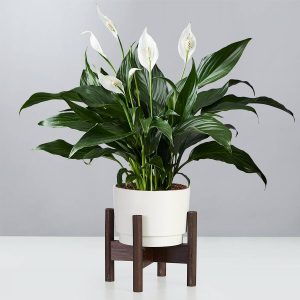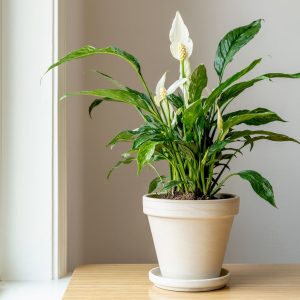Pothos plants—they are gorgeous and easy to take care of! And there are a bunch of different pothos varieties to choose from. Here are 11 varieties, including pictures and how to identify them.
11 gorgeous pothos varieties to add to your collection!
I recently finished up publishing a bunch of care guides for the different pothos varieties I own, so I thought it’d be appropriate to round them all up into one spot! They generally have the same care, but there are some things to keep in mind when growing some of the trickier varieties.
I’ve also found that some pothos varieties can be hard to differentiate. And there is sooo much information out there about different plants. So I’m including lots of photos and tips to help you ID which pothos variety you have, too. So let’s get started.
But first—what is a pothos plant?
I want to be super clear up front that I will only be covering epipremnum plants—not scindapsus plants. If that sounds like a foreign language, let me break it down for you real quick!
Epipremnum is a genus of plants, and epipremnum aureum is generally regarded as the full scientific name for the plant often referred to as “pothos” plants. I say generally regarded because a lot of people consider “scindapsus” plants to be pothos plants as well.
Scindapsus is a separate genus of plants, but it is closely related toepipremnum. Scindapsus plants have similarly shaped leaves and also trail and climb like epipremnum pothos plants do. A common example of a scindapsus plant that is often referred to as a pothos is the scindapsus pictus exotica, often referred to as “silver satin pothos.”
However, scindapsus plants have slightly different care needs (and some scindapsus plants are downright finicky). So I don’t like lumping scindapsus in with epipremnum when talking about pothos plants. And—most importantly—when people say “pothos,” they are often referring toepipremnum plants.
So here are the 11epipremnum pothos varieties!
Don’t get me wrong, I love scindapsus plants. They are some of my favorites! But we’re going to cover 11epipremnum-only pothos varieties in this post. First up: old trusty jade.
1. Jade Pothos (Epipremnum Aureum Jade)
I can safely put my money behind jade pothos, or epipremnum aureum jade, as the easiest pothos variety there is. The traditional heart-shaped leaves that pothos plants are famous for are solid green. This variety has no variegation (though occasionally some leaves might throw a lil yellow variegation to keep things spicy).
It trails beautiful, and the leaves don’t decrease in size as the plant trails. This makes it an excellent candidate for a hanging basket. And since the leaves are solid green, you can throw this bad boy in even lower-light areas of your home. Check out my original pothos plant care guide for more.
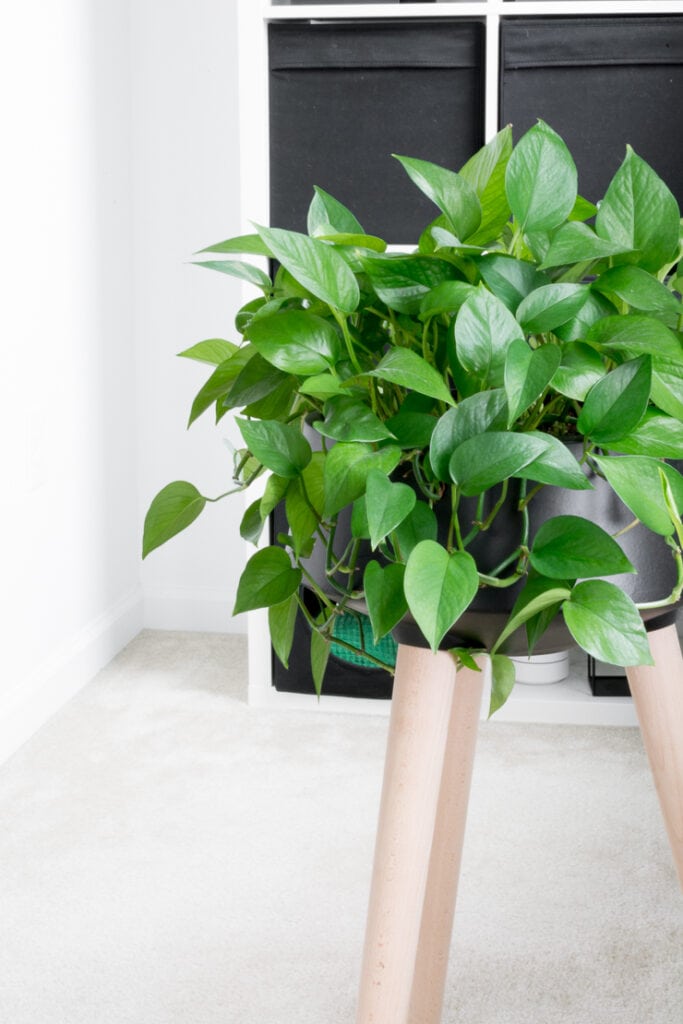
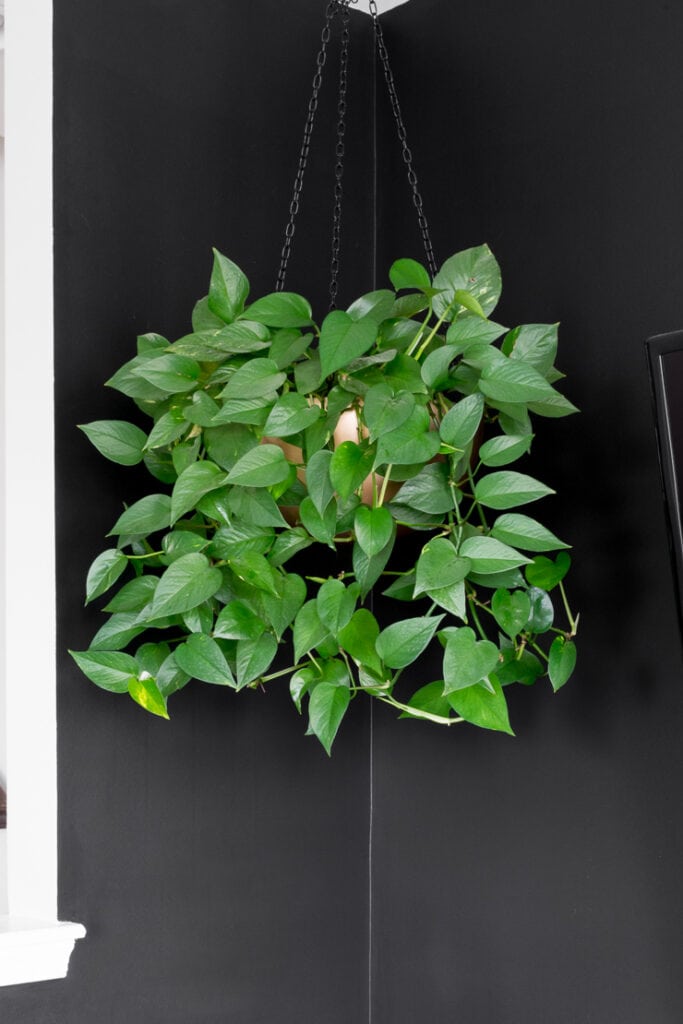
2. Golden Pothos (Epipremnum Aureum Golden)
Another extremely common variety of pothos is golden pothos, orepipremnum aureum golden. Golden pothos looks pretty much exactly the same as jade pothos, except it has a gorgeous yellow variegation. The plant can get very highly variegated with a ton of bright, indirect light.
It also looks lovely trailing. I had one outside on my shaded patio for the spring and summer. As you can see, the conditions were amazing. Humidity and high temps really helps this one grow like a weed, and the leaves were nice and big!
Speaking of, a lot of people say there is a variety of golden pothos called “Hawaiian pothos.” However, I have read that “Hawaiian pothos” is actually just a mature form of golden pothos. If golden pothos climbs something and has ideal growing conditions, the leaves get HUGE and even develop fenestrations.
For more, check out my post on how to propagate golden pothos from cuttings. It’s one of the best plants for beginner plant propagation enthusiasts!
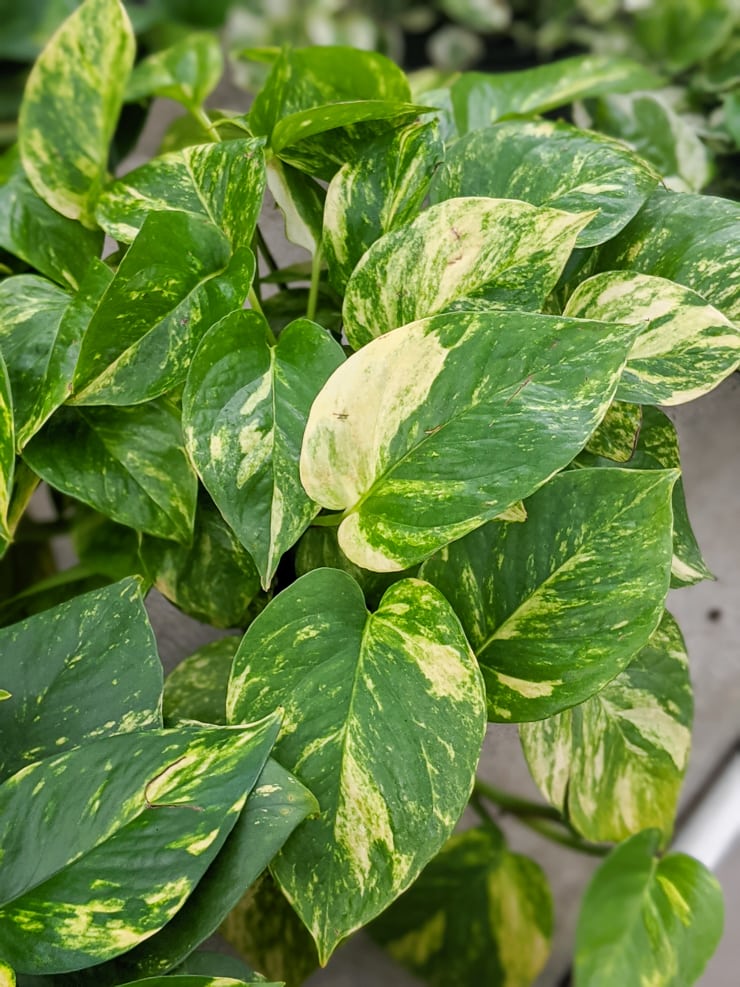
3. Jessenia Pothos (Epipremnum Aureum Jessenia)
Jessenia pothos (epipremnum aureum Jessenia) is similar to golden pothos but much harder to find. I don’t get the hype over Jessenia, to be honest. I actually don’t own this variety. The variegation is a limey-yellow and green instead of yellow and green. And it is a bit more watercolory-looking to me.
4. Marble Queen Pothos (Epipremnum Aureum Marble Queen)
Marble queen pothos or epipremnum aureum marble queen is one of my favorite pothos varieties. It is easy to find but not quite as common as golden and jade pothos. It has a similar splashy variegated pattern to the golden, but the colors are green and cream. Some of the leaves on my marble queen pothos are even mostly cream.
However, the leaves generally have a good mix of green and cream. Make sure to give this variety plenty of bright indirect light to encourage a good balance of green and cream. Too little light won’t kill the plant, but it will likely lead to less cream and more green. See my marble queen pothos care guide for more.
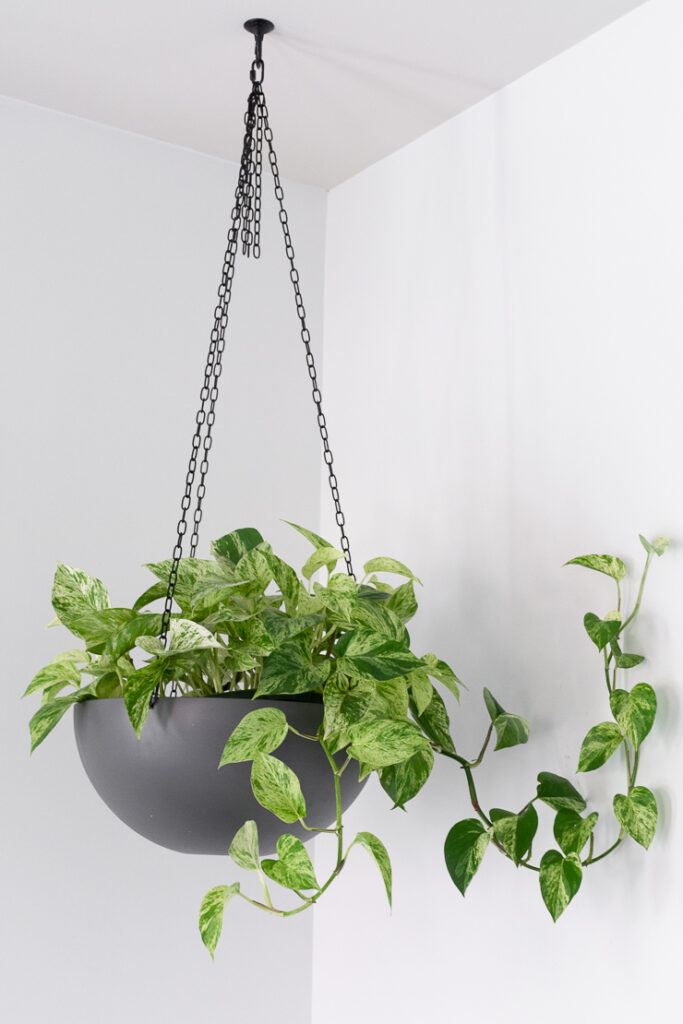
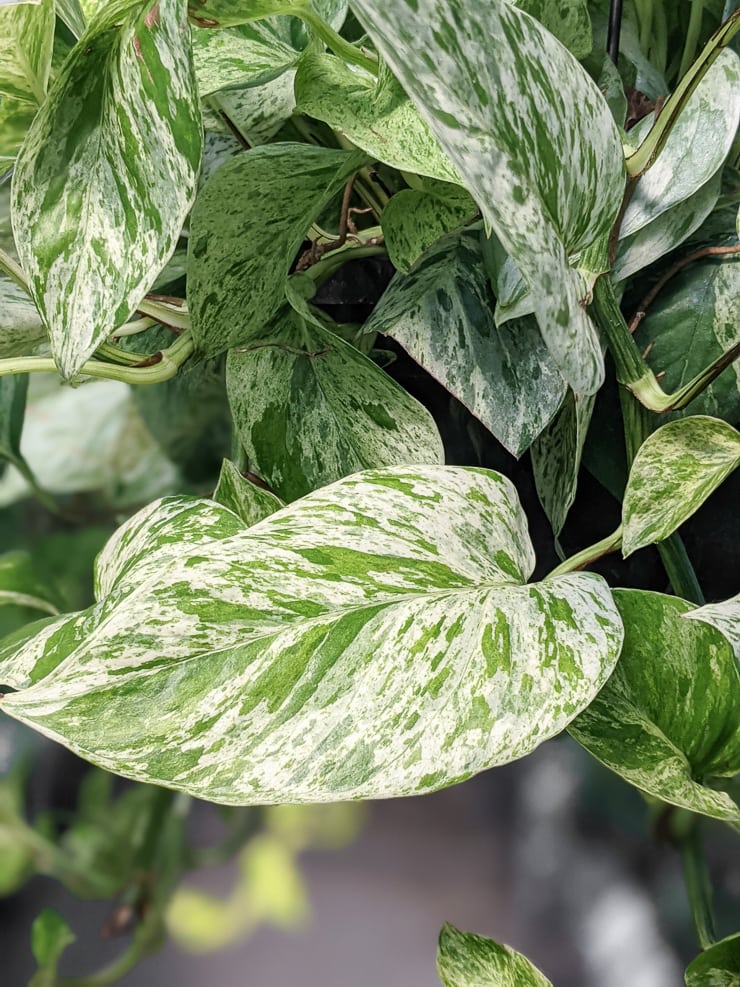
5. Snow Queen Pothos (Epipremnum Aureum Snow Queen)
Epipremnum aureum snow queen, or snow queen pothos, is an absolutely stunning variety of pothos. I have seen some say that it is simply a highly variegated form of marble queen pothos, but I don’t think so.
While marble queen pothos tends to have a green base with splotches of cream, snow queen pothos tends to have a cream (sometimes nearly white) base and splotches of green. It’s simply stunning! Given the high variegation, this one needs a lot of bright, indirect light.
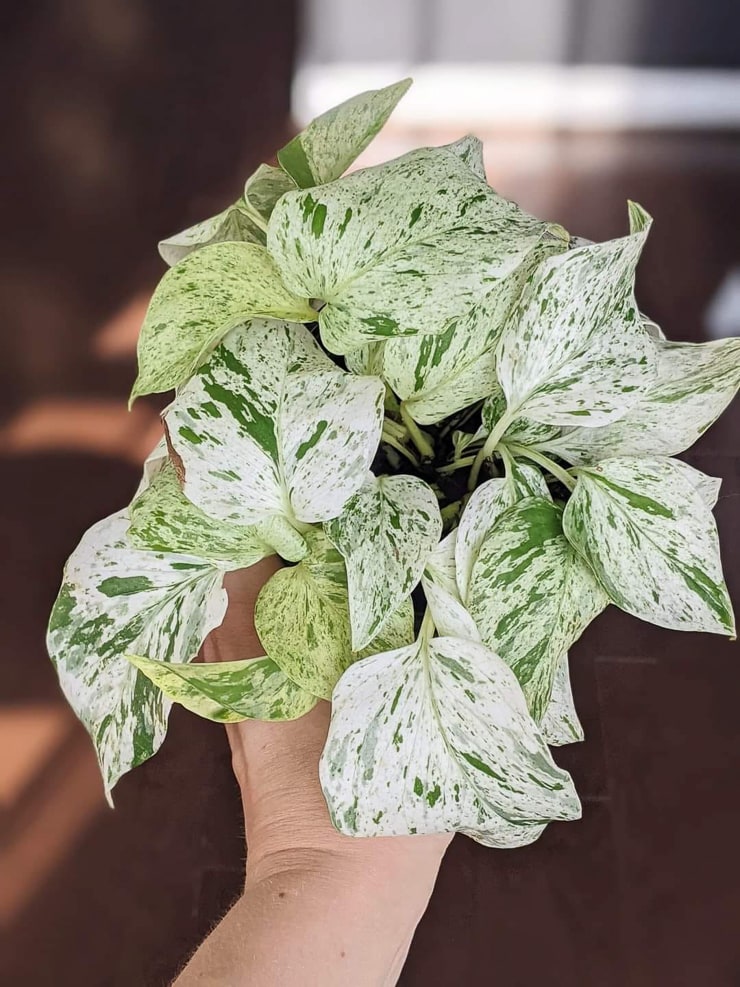
6. Neon Pothos (Epipremnum Aureum Neon)
Neon pothos (epipremnum aureum neon) is an absolutely stunning variety of pothos! Often confused with the lemon-lime heart-leaf philodendron, neon pothos has an awesome highlighter-yellow-like color. It really adds some visual interest in groups of plants with medium- to dark-green tones.
To keep the neon color, you’ll need to give your neon pothos plenty of bright indirect light. It will survive just fine in lower light conditions, but it will deepen in color to more of a green (see second pic below). The leaves can also deepen in color over time. See my neon pothos care guide for more.


7. Manjula Pothos (Epipremnum Aureum Manjula)
Manjula pothos, aka epipremnum aureum manjula, is a trendy pothos variety right now. I’ve heard of people finding huge gorgeous baskets at grocery stores, but I’ve never seen one. The plants I’ve had have been small, but that’s okay. They grow decently well when they have optimal care!
Manjula pothos has a variegated pattern of green, cream, and white that is more splotchy than speckled. Its leaves are also wider than other pothos varieties, and they also curl up a bit. Leaf shape is often the easiest way to identify it. Learn more about manjula pothos care.

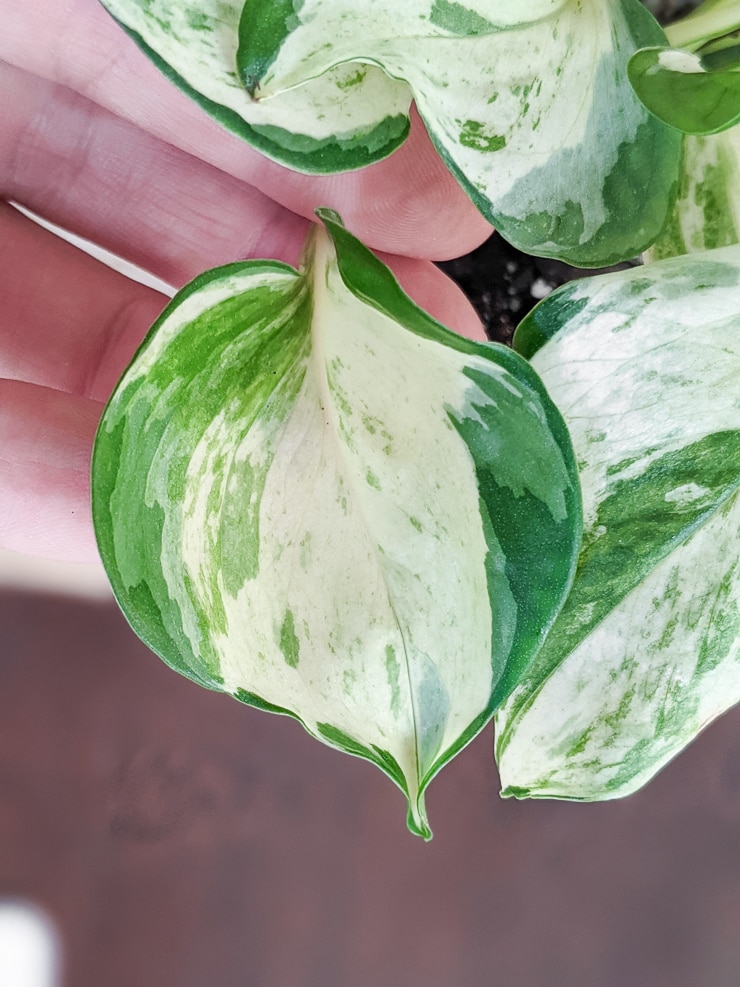
8. Pearls and Jade Pothos (Epipremnum Aureum Pearls and Jade)
Pearls and jade pothos (epipremnum aureum pearls and jade) is a newer variety of pothos. It was created in a lab in Florida, where researchers induced mutations in four different common pothos varieties in order to develop new varieties. It’s actually a mutation selection from a group of marble queen pothos plants.
Pearls and jade pothos leaves stay smaller than other pothos varieties, but the splotchy green and white variegation is still gorgeous! You can check out my pearls and jade pothos care guide for more.
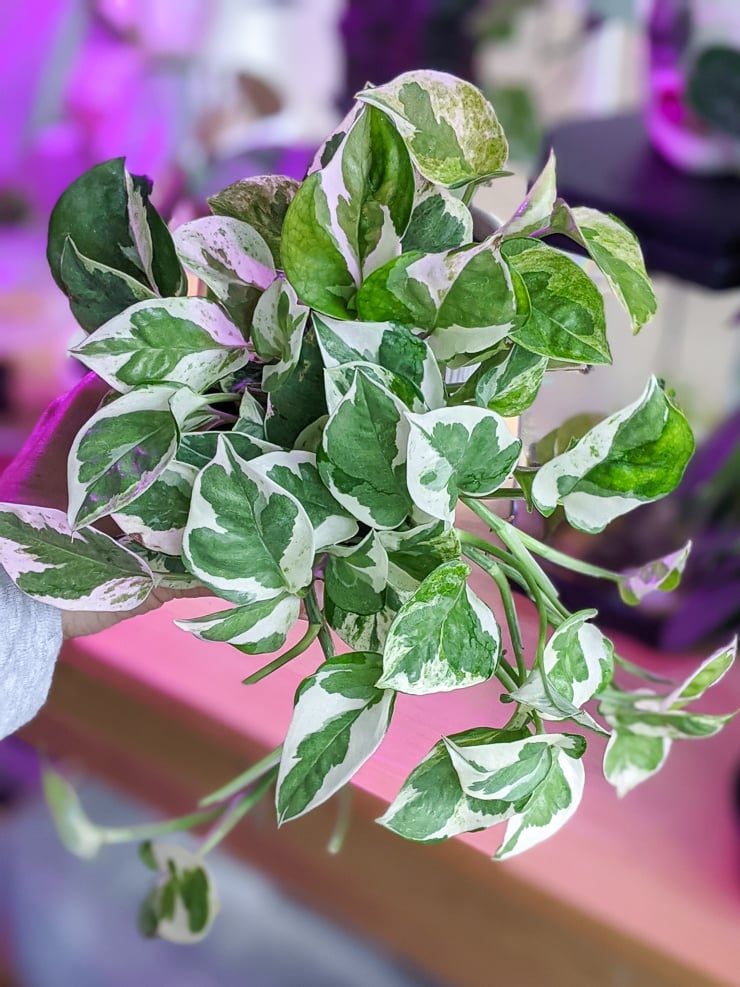
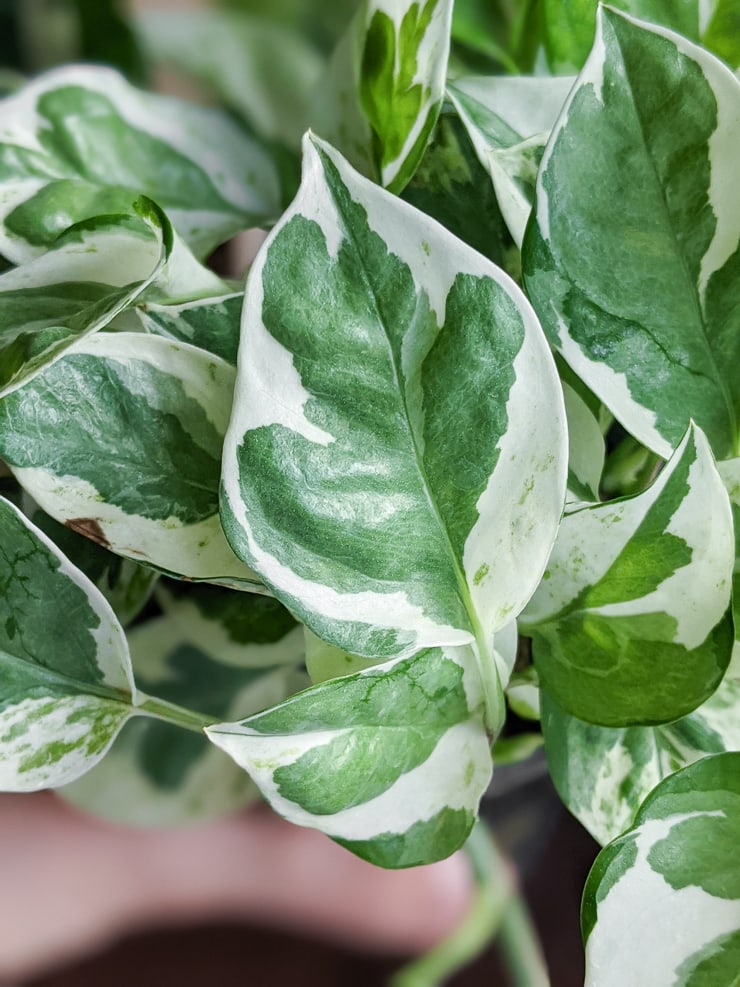
9. Cebu Blue Pothos (Epipremnum Pinnatum Cebu Blue)
Cebu blue pothos is a gorgeous and unique pothos variety that is suuuper trendy right now. It’s an epipremnum but isn’t an aureum like the others I’ve outlined. It’s a pinnatum, soepipremnum pinnatum cebu blue is its full name.
The leaves on the cebu blue pothos are long and lean with a stunning blue-green color and a bit of a silver sheen. I have noticed that cebu blue is a beautiful trailing plant, but its leaves get smaller as the stems get longer. It is begging to climb—and if you do give it something to climb, the leaves will get bigger and bigger, eventually developing fenestrations like a monstera deliciosa!
To read more about this plant, check out my cebu blue pothos care guide. I also wrote a detailed cebu blue propagation guide since this is such a hot plant right now and lots of people are buying cuttings of it!
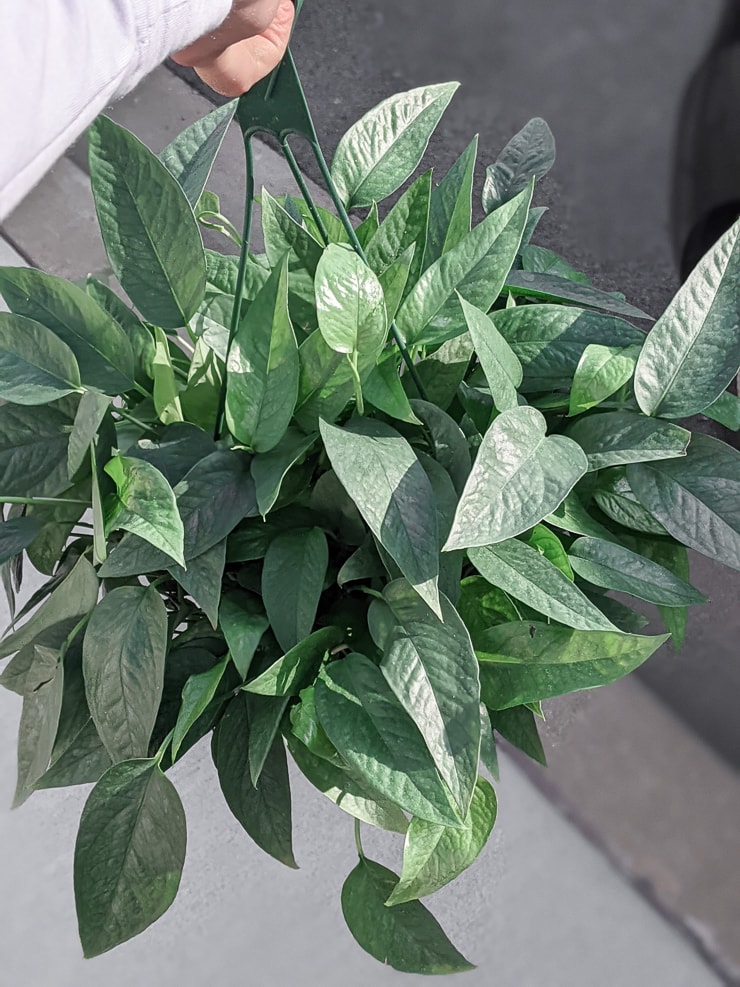
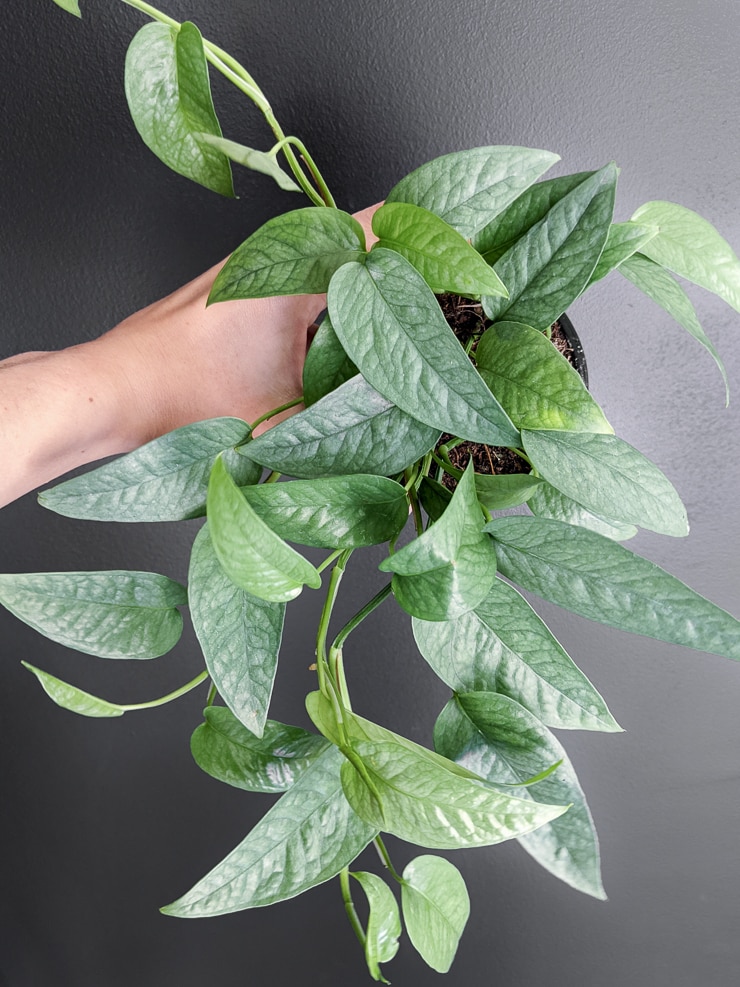
10. Baltic Blue Pothos (Epipremnum Pinnatum Baltic Blue)
Baltic blue pothos is another epipremnum pinnatum variety. It has darker blue-green leaves that resemble cebu blue pothos leaves, just without the metallic sheen. The leaves on this one also fenestrate, but it doesn’t need to get super mature like the cebu blue does.
You’ll likely see baltic blue more often this year because Costa Farms is growing it now. Check out my Baltic Blue pothos care post for more, including a bunch of pics of my new plant!

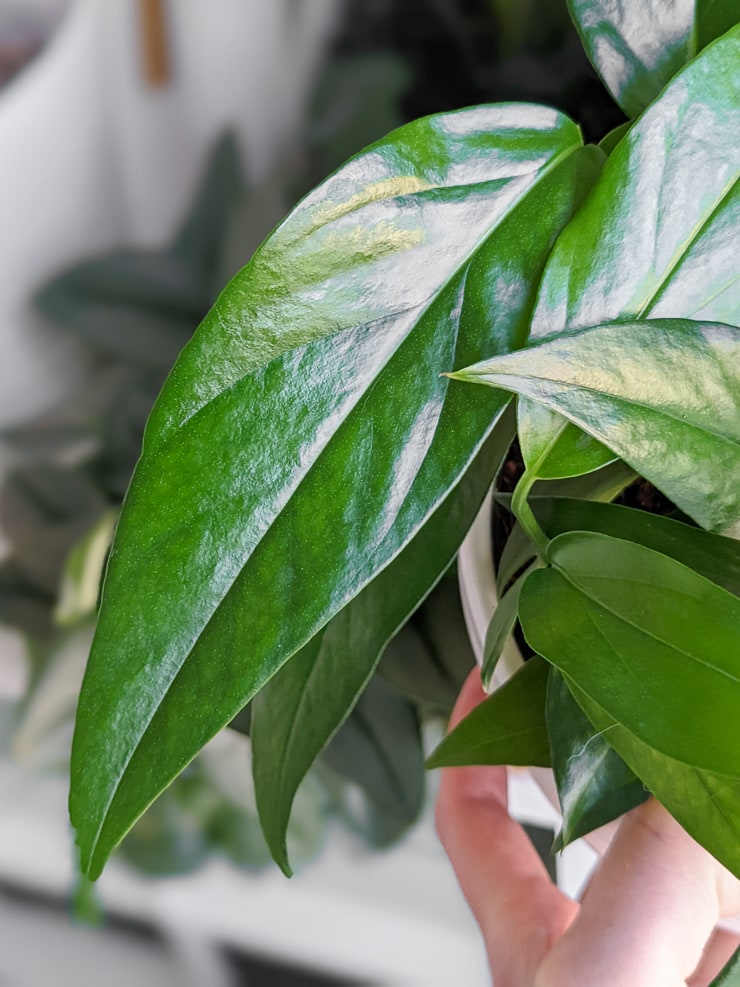
11. Global Green Pothos (EpipremnumAureum Global Green)
And last but not least, one of the newest varieties of pothos—global green pothos! I have tried to find its origin, and all I can find is that in 2020, Costa Farms started selling it and announced it as an “exciting new member of the pothos family” with “rich dark and light green marbling.”
Global green pothos plants have a darker green border and lighter green variegated splotches on the leaf’s interior. The variegation is also more “pixelated” looking. Check out my global green pothos care guide for more.
